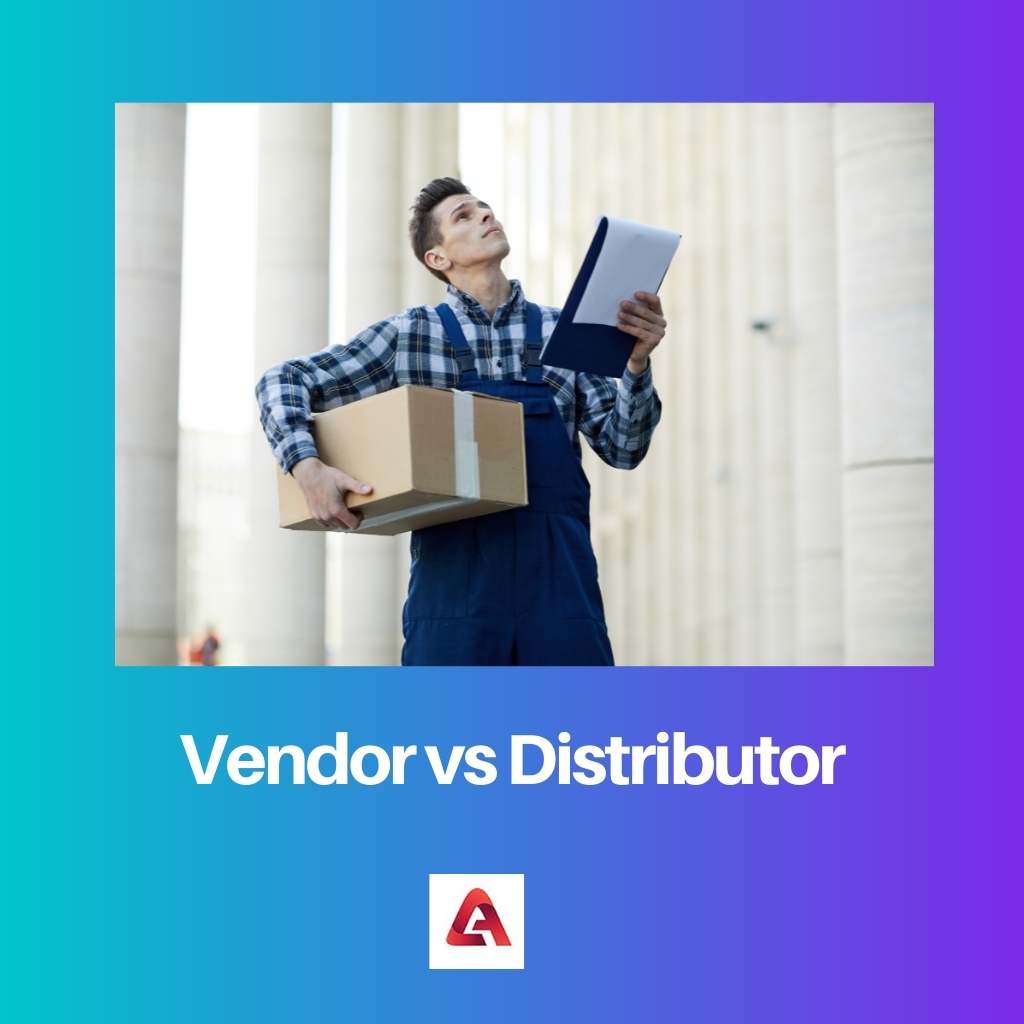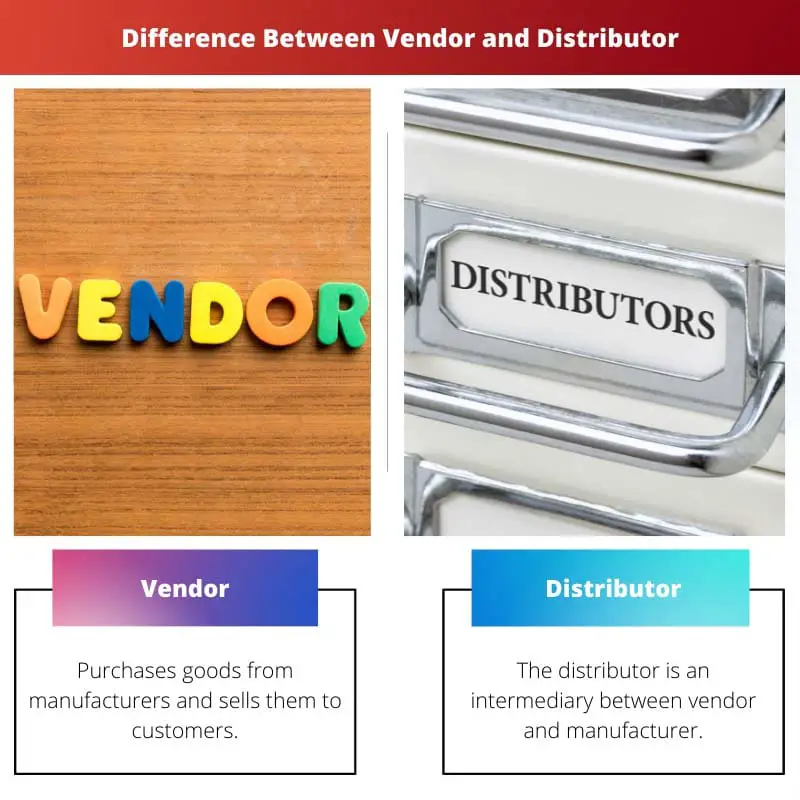The term market is widely and closely associated with our day-to-day lives. When it comes to marketing, the two most important elements are vendor and distributor.
Although these two words are commonly used, they vary in their features and functioning. Both vendors and distributors are interdependent on each other but cannot be used interchangeably.
Key Takeaways
- Vendors are suppliers that sell products or services, while distributors act as intermediaries between vendors and customers.
- Vendors focus on manufacturing and selling goods, whereas distributors manage logistics, inventory, and the movement of goods.
- Distributors work with multiple vendors, creating a larger network for product availability.
Vendor vs Distributor
The difference between a vendor and a distributor is that a vendor is a person who buys goods in bulk quantities and sells them to the customers according to their requirements, whereas a distributor forms the supply chain between manufacturer and vendor. The distributor collects goods from the place of the manufacturer and supplies them to a vendor, who in turn supplies them to customers.

A vendor is a person who buys goods from the manufacturer and sells them to customers as per their requirements.
A vendor forms a supply chain between the distributors and customers and also provides personalized services to customers.
They also collect information regarding the demand of the market and provide them to manufacturers so that there is a balance between demand and supply.
A distributor is a person who collects goods from the place of manufacturer and deliveries them to the place of a vendor who sells them to customers.
In short, they perform the role of intermediary for manufacturers and vendors. The objective of the distributor is to avail all the goods to the other vendors so that the ultimate customers can consume them.
Comparison Table
| Parameters of Comparison | Vendor | Distributor |
|---|---|---|
| Definition | Purchases goods from manufacturers and sells them to customers. | The distributor is an intermediary between vendor and manufacturer. |
| Goal | Give customers their required goods. | Avail goods to the vendors to resell. |
| Business relationship | Business to customers (B2C) | Business to business (B2B) |
| Relationship with market | Collects information about market demand and provides them to manufacturers. | Product transportation, advertisements, etc. |
| Relationship with manufacturers | Distinct relationship as compared to distributors. | Close relationship as compared to vendor. |
What is Vendor?
A vendor is a person who purchases goods from manufacturers in bulk quantities and sells them to customers as per their required needs.
They also provide personalized services to the customers such as free home delivery, discounts, etc, and also provide credit sales to regular customers.
Since they are in a close relationship with customers, they recognize what they need, analyze market demand, and supply information to the manufacturers so that the demand and supply will be balanced and the economy will be in equilibrium.
The objective of the vendor is to provide goods and services to the final customers and has a B2C business relationship. The vendor occupies the last and final position in the supply chain link.
Vendors have a distinct relationship with manufacturers as they have an intermediary between them and do not have a direct relationship.
When it comes to risk, vendors have less risk as they only perform the function of selling goods to ultimate customers.
The purpose of sales made by the vendor is the consumption by the customers and not for production or for resell. The amount of products they deal with is relatively small than the distributors.

What is Distributor?
A distributor is an intermediary between a manufacturer and a vendor. Usually, goods are manufactured in one place but have been used all over the world.
Hence, the distributor bridges the gap between the manufacturing place and the market or where they are consumed.
They provide many services to manufacturers, like transportation, warehousing, storage, advertisements, and demos for the usage of products, etc.
Henceforth, distributors play an important role and greatly help manufacturers.
Being freed from these functions, manufacturers can focus or concentrate only on the quality and types of the goods they produce.
A distributor has a closer relationship with the manufacturer and shares a distinct relationship with the market or the customers.
They provide B2B business services. In terms of risk, distributors have higher levels of risk as they have to bear all the damages caused to the goods during transportation or storage.
The objective of the distributor is to avail the goods to different vendors to resell.
They sell goods either for further production or resell but not for consumption. They make purchases in bulk quantities. It occupies the middle position in the supply chain.
An important feature of distributors is they don’t add value or make products; they make products available to vendors.
Main Differences Between Vendor and Distributor
- The vendor deals with a small number of goods in comparison with the distributor.
- In terms of risk, distributors have greater risk than vendors since goods are prone to damage in transportation.
- Distributors make sales only for further production of capital goods or resell, whereas vendors make sales for consumption.
- Distributors have a closer relationship with the manufacturers than the vendors, as they are in direct contact.
- Vendors know the market conditions and demands, whereas distributors know about the product information and usage.
- The difference between vendors and distributors is their business relationship. The vendor provides B2C services, whereas the distributor provides B2B services.

- https://journals.sagepub.com/doi/abs/10.1177/0092070398262004
- https://www.emerald.com/insight/content/doi/10.1108/13598540810894942/full/html

The article effectively captures the nuances of the vendor-distributor relationship and offers a comprehensive comparison between the two. Well researched and presented.
Fantastic explanation of the roles of vendors and distributors. The comparison table is particularly useful for understanding the distinctions between the two.
This article gives a clear, concise overview of the key differences between vendors and distributors. I appreciate the straightforward approach.
You have provided valuable information that is easy to understand.
I believe the article should have included more examples to provide a deeper understanding of the applications of vendors and distributors in real-life scenarios. This would enhance the reader’s comprehension.
This article is overly simplistic and generalizing in its approach to discussing vendors and distributors. It would benefit from a more critical and analytical perspective to truly engage the audience.